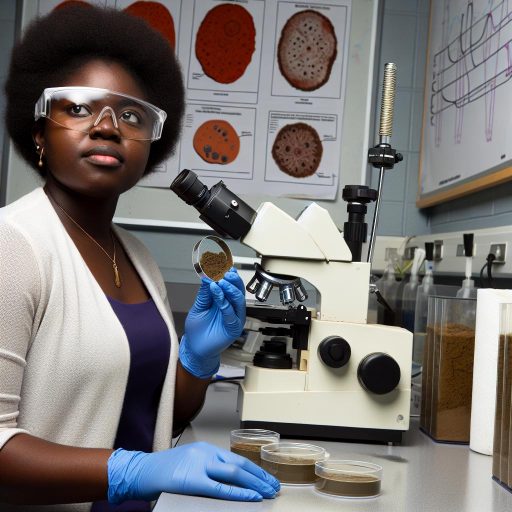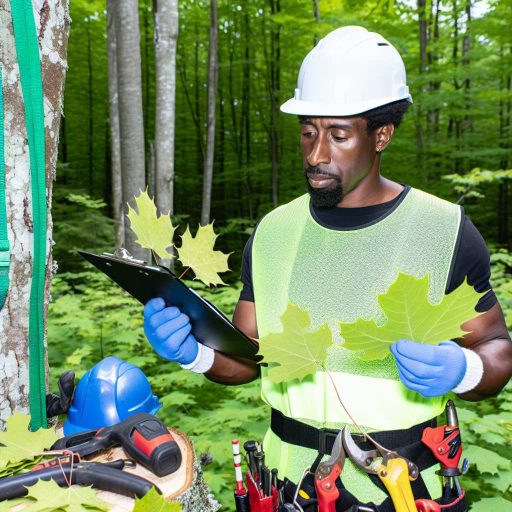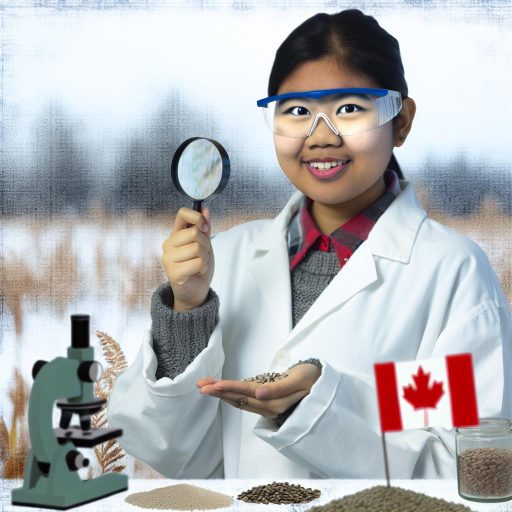Understanding the Role of Soil Scientists in Canada
Defining Soil Science
Soil science is the study of soil as a natural resource.
It involves understanding soil formation, classification, and mapping.
Additionally, soil scientists analyze soil’s physical and chemical properties.
The Importance of Soil Scientists
Soil scientists impact agriculture and environmental sustainability in Canada.
They help ensure soil health for food production.
This discipline is vital for environmental conservation efforts.
Key Responsibilities of Soil Scientists
- Conducting soil surveys to assess land use potential.
- Researching soil management practices to enhance soil fertility.
- Advising farmers on optimal soil health practices.
- Engaging in policy-making to promote sustainable land management.
Work Environments for Soil Scientists
Soil scientists work in various settings across Canada.
Many are employed by government agencies or research institutions.
Others may work for agricultural companies or environmental consultancies.
Fieldwork is crucial for hands-on soil assessment and monitoring.
Skills Essential for Soil Scientists
Analytical skills are vital for interpreting soil data.
Strong communication skills aid in sharing research findings.
Furthermore, problem-solving skills are essential for addressing soil issues.
Technical proficiency in software for data analysis is also important.
Career Pathways and Opportunities
Soil scientists can pursue various career paths in Canada.
Options include academic positions, research roles, or private sector jobs.
Many also find opportunities in environmental consulting firms.
Networking and continuous education enhance career advancement prospects.
Key Skills Required for Career Advancement in Soil Science
Technical Proficiency
Soil scientists must develop strong technical skills.
Understanding soil composition aids in better research outcomes.
Familiarity with laboratory techniques is crucial for effective analysis.
Effective use of soil testing equipment enables accurate results.
Digital tools for data analysis enhance research productivity.
Research and Analytical Skills
Critical thinking is essential for evaluating scientific data.
Effective problem-solving approaches lead to innovative solutions.
Unlock Your Career Potential
Visualize a clear path to success with our tailored Career Consulting service. Personalized insights in just 1-3 days.
Get StartedAttention to detail ensures high-quality research outputs.
Staying current with scientific literature is vital for ongoing learning.
Communication Skills
Clear communication enhances collaboration among scientists.
Writing skills help in publishing research findings effectively.
Presenting results at conferences improves professional visibility.
Engaging with the public helps raise awareness about soil issues.
Interdisciplinary Collaboration
Soil science often involves working with other disciplines.
Collaboration with agronomists can improve agricultural practices.
Partnering with environmental scientists fosters sustainable solutions.
Networking with industry professionals opens career advancement opportunities.
Project Management Abilities
Managing projects ensures that research stays on track.
Effective time management helps meet deadlines without compromising quality.
Resource allocation skills optimize team performance.
Setting clear goals aligns the team’s focus and motivation.
Continuous Learning and Adaptability
The field of soil science is constantly evolving.
Being adaptable to new technologies is essential for growth.
Participating in workshops enhances professional knowledge.
Seeking mentorship provides guidance for career development.
Educational Pathways: Degrees and Certifications for Soil Scientists
Undergraduate Degrees
Soil scientists typically begin their journey with a bachelor’s degree.
A degree in soil science, environmental science, or agriculture is beneficial.
These programs often include hands-on laboratory and fieldwork courses.
Courses in biology, chemistry, and geology provide essential foundational knowledge.
Completing a co-op or internship enhances practical experience.
Institutions such as the University of Alberta offer specialized programs.
Graduate Degrees
A master’s degree can significantly enhance career prospects for soil scientists.
Many professionals pursue a Master of Science in Soil Science or a related field.
This level of education allows for specialization in areas like soil management.
Graduate programs often emphasize research, providing valuable skills.
Students conduct experiments that contribute to advancements in soil science.
Furthermore, a Ph.D. may be necessary for those aiming for academic positions.
Certifications and Professional Development
Certification can differentiate professionals in the job market.
The Canadian Society of Soil Science offers certification for qualified members.
This credential demonstrates a commitment to the field and ongoing education.
Continuing education courses enable soil scientists to stay updated on advancements.
Networking opportunities through organizations can also support career growth.
Online Learning Opportunities
Online courses provide flexibility for working soil scientists.
Professionals can pursue additional certifications or degrees without geographical constraints.
Platforms such as Coursera and edX offer relevant programs.
These courses often cover contemporary topics like sustainable practices.
By engaging in online learning, soil scientists can broaden their knowledge base.
Explore Further: How Seed Technologists Ensure Food Security in Canada
Networking Opportunities for Soil Scientists in Canada
Importance of Networking
Networking plays a crucial role in career development for soil scientists.
It facilitates collaboration with peers and industry professionals.
Additionally, strong networks provide access to job opportunities.
Soil scientists can share research and innovations through these connections.
Professional Associations
Joining professional associations is an effective networking strategy.
The Canadian Society of Soil Science (CSSS) offers various membership benefits.
Members receive newsletters and access to industry events.
Engaging in workshops can enhance professional skills and knowledge.
Another key organization is the Soil and Water Conservation Society (SWCS).
This platform fosters networking among conservation professionals.
Conferences and Workshops
Attending conferences is an excellent way to meet other professionals.
Events like the annual CSSS conference bring together soil scientists nationwide.
At these conferences, participants can attend presentations and workshops.
Workshops often focus on recent developments in soil science research.
Networking during breaks and social gatherings promotes collaboration.
Online Platforms and Social Media
Utilizing online platforms can expand networking opportunities significantly.
LinkedIn is a powerful tool for connecting with industry professionals.
Joining relevant groups can facilitate discussions about soil science topics.
Twitter can be useful for following experts and organizations in the field.
Participating in online forums helps share knowledge and resources.
Collaborative Research and Projects
Collaborative research initiatives boost networking for soil scientists.
Partnering with universities and research institutions can enhance project reach.
Engaging in multidisciplinary projects encourages diverse perspectives.
Such collaborations often lead to innovative solutions in soil management.
Networking through research projects can strengthen professional relationships.
Local Community Engagement
Getting involved in local community initiatives offers additional networking avenues.
Soil scientists can participate in community outreach programs.
Education initiatives raise awareness about soil health and conservation.
Working with local organizations fosters connections with stakeholders.
These interactions enhance visibility and community engagement.
Discover More: Innovations in Seed Technology for Sustainable Farming
Research and Development: Importance for Career Growth
Enhancing Knowledge and Skills
Research and development (R&D) plays a critical role in the career advancement of soil scientists.
Engaging in R&D allows professionals to enhance their knowledge and remain competitive.
Additionally, ongoing research helps scientists develop innovative solutions for soil management.
This adaptability is crucial in a rapidly changing environmental landscape.
Creating Networking Opportunities
Participating in R&D fosters connections with other professionals in the field.
Networking with researchers and industry leaders opens doors to collaborative projects.
These collaborations often lead to new job opportunities and career advancements.
Ultimately, strong professional relationships can enhance one’s reputation in the industry.
Publishing Findings and Gaining Recognition
Publishing research findings in reputable journals is vital for career growth.
Academic publications establish credibility and demonstrate expertise in soil science.
This recognition often attracts attention from employers and grants agencies alike.
Consequently, visible contributions to the field can enhance career prospects significantly.
Driving Innovation in Soil Science
Research and development drive innovation across various agricultural practices.
Innovative solutions contribute to more sustainable land use and soil health.
As a result, soil scientists who lead R&D initiatives can influence industry standards.
This leadership role can pave the way for promotions and other career advancements.
Professional Development and Training
R&D offers valuable opportunities for ongoing professional development.
Soil scientists can acquire new skills through workshops and training programs.
This continuous learning keeps their expertise relevant in evolving fields.
Moreover, advanced training often leads to higher positions and expanded responsibilities.
Improving Problem-Solving Abilities
Engaging in R&D enhances critical thinking and problem-solving skills.
These skills are essential for navigating complex soil-related challenges.
Developing solutions requires analytical thinking and creativity, both of which improve through R&D.
Thus, soil scientists become more effective in their roles and elevate their career potential.
You Might Also Like: Challenges in Implementing Sustainable Farming Solutions

Professional Organizations and Associations for Soil Scientists
Importance of Professional Organizations
Professional organizations play a vital role in advancing the careers of soil scientists.
They provide networking opportunities and professional development resources.
Furthermore, they advocate for soil science on various platforms.
Key Canadian Organizations
Several organizations cater specifically to soil scientists in Canada.
- The Canadian Society of Soil Science promotes soil research and education.
- The Soil Conservation Council of Canada focuses on sustainable soil management.
- The Canadian Association of Professional Soil Scientists provides certification and support for professionals.
Canadian Society of Soil Science
This society offers resources for research dissemination and collaboration.
Members can access journals, conferences, and networking events.
Additionally, the society fosters educational initiatives for the public.
Soil Conservation Council of Canada
This council advocates for sustainable soil practices across the country.
It works with farmers, government bodies, and researchers.
Moreover, the council provides tools and resources for effective soil management.
Canadian Association of Professional Soil Scientists
This association helps members gain recognition in the industry.
Certification enhances professional credibility and job prospects.
The association also hosts workshops and training sessions.
Global Connections
Many Canadian soil scientists benefit from international organizations as well.
The International Union of Soil Sciences connects professionals globally.
Through these connections, scientists can exchange knowledge and collaborate on research.
Networking Opportunities
Attending conferences is a great way to meet fellow soil scientists.
These events facilitate knowledge sharing and collaboration on projects.
Additionally, local chapters often host seminars and networking events.
Resources and Publications
Professional organizations often publish research, bulletins, and newsletters.
These resources keep members informed about recent developments.
Access to scholarly articles also supports ongoing education.
Find Out More: Key Skills Needed to Excel as a Seed Technologist
Government Policies and Their Impact on Soil Science Careers
Overview of Relevant Policies
Government policies significantly influence the field of soil science in Canada.
These policies affect funding, research opportunities, and job availability.
Moreover, they shape educational programs that prepare students for careers in soil science.
Funding Opportunities
Various governmental grants support research in soil science.
For instance, the Canadian Foundation for Innovation offers funding for innovative projects.
Similarly, Agriculture and Agri-Food Canada provides grants to improve soil health.
These funding opportunities enhance professional growth for soil scientists.
Research and Development Support
Government initiatives promote research in sustainable agriculture and soil management.
The policies encourage collaboration between universities and research institutions.
Consequently, these collaborations yield significant advances in soil science.
Educational Policies and Training
Educational policies define the curriculum for soil science programs in Canadian universities.
They ensure that students gain essential skills for their careers.
Furthermore, active learning opportunities enhance students’ practical experiences.
Career Advancement Outlook
Government policies directly impact job market trends for soil scientists.
Positions in environmental consulting and agricultural management are growing.
Moreover, expertise in soil management is increasingly in demand across sectors.
Networking and Professional Development
Government-supported conferences provide networking opportunities for soil scientists.
These events foster collaboration and knowledge sharing among professionals.
Additionally, workshops offer training and updates on current soil science practices.
Emerging Trends in Soil Science and Their Career Implications
Adoption of Technology
Technological advancements shape the future of soil science significantly.
Precision agriculture increasingly relies on data analytics and remote sensing.
Soil scientists must adapt to these technologies to maintain relevance.
Familiarity with soil sensors and drones enhances career prospects.
Continuous education on emerging tech tools is crucial for career growth.
Focus on Sustainability
The shift toward sustainable practices drives demand for soil expertise.
Soil scientists play a critical role in environmental conservation.
Understanding sustainable practices improves employability in various sectors.
Professionals must advocate for soil health as a key component of sustainability.
Interdisciplinary Collaboration
Soil science increasingly intersects with various disciplines.
Collaboration with agronomists, ecologists, and other scientists is essential.
This multidisciplinary approach enhances problem-solving capabilities.
Networking across fields opens new career opportunities.
Such collaboration often leads to innovative solutions for soil management.
Regulatory and Policy Development
Soil scientists are integral to shaping environmental policies.
Understanding regulatory frameworks is vital for career advancement.
Involvement in policy development influences sustainable practices globally.
Soil professionals should engage with policymakers to impact legislation.
Research and Innovation in Soil Management
Ongoing research enhances soil management strategies considerably.
Innovation drives improvements in soil health and productivity.
Soil scientists must stay updated on the latest research findings.
Publishing research can enhance professional recognition and career prospects.
Participation in research projects fosters valuable skills and knowledge.
Additional Resources
Shawna Cox, PhD – Detailee with the Chief of Research Security …




